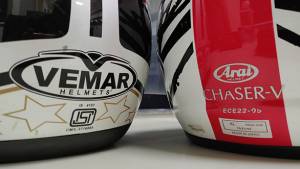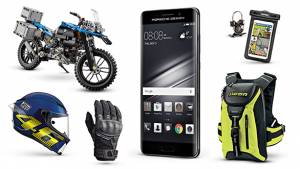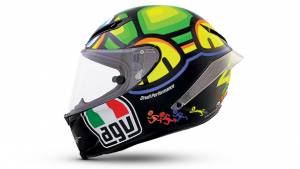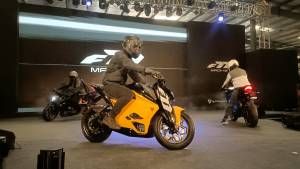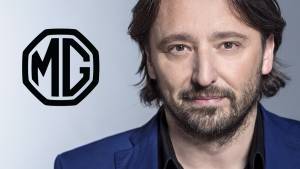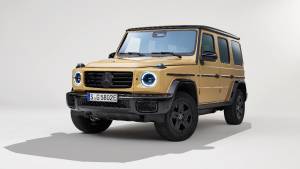The future of motorcycling is in India, says Dainese CEO Federico Minoli
Dainese, a globally respected motorcycle protective gear brand, is opening its first store in India in Bangalore. The Italian brand has tied up with Bangalore-based Tusker Pam Pvt Ltd, which among its number of automotive ventures also owns a Harley-Davidson showroom in the city. [Read full report here]
OVERDRIVE caught up with Dainese CEO Federico Minoli and Tusker CEO Srinivas Reddy, who also heads Dainese & AGV India, at the launch of the D-store. Here are excerpts of our chat with the two men regarding future of protective gears in India and their plans for the country in not-so-distant future.
OD: What is Tusker?
Srinivas Reddy: Tusker Group is a company incorporated a few years ago; we mainly deal with automobiles. We have been dealing with automobiles for the last three years now, with some of the brands that have come into India in the past few years. And we are also into riding gear and certain merchandise. So exclusively for the riders, motorcycle riders and bicycle riders.
OD: Other businesses
SR: Yes, we are into property and construction.
OD: What is Dainese?
Federico Minoli: Dainese is a global brand that specialises in protecting motorcyclists. It was founded in 1972, and since then has only really had one mission, which is to enhance safety and protect people who have a lot of fun riding.
OD: Biggest markets?
FM: Still the European markets - Germany and France. And now, we are developing very fast in the US. Then in S America, and now in Asia.
OD: Whose idea was it to bring Dainese to India?
SR: It was Dainese themselves. Mr Minoli was a big part of it and Mr Tomaso, who is the area manager for the Asia Pacific, was mainly responsible for getting this brand into India.
OD: Premium brand. India?
SR: We believe safety is paramount whether you ride on or off-road. We, in this country, have not seen safety available to the rider at any given point of time. So for us to get this safety, we had to travel overseas and get the protection. But now for the very first time we, Dainese, are going to make that available to the end-user, to the motorcycle rider. It's what we are trying to do here.
OD: Internal recession? Does that affect Dainese?
FM: In fact, I think that we see the markets going down, particularly in S Europe. But everywhere else, the market is actually up. Our orders this year are about 20 per cent higher than last year. So that signals the end of recession in particular areas. Like the US. Then there is the entire world outside of Europe that is really booming and that is where India comes to play. Not for what India is today but because we do know India will boom. It has a booming middle-class, there is a lot of energy here. The future of motorcycling is really here. We want to be part of that future. We want to have the first mover advantage.
OD: What is the Dainese-Tusker relation?
SR: We have a master-franchisee relationship between the two. We are going to open the first dealership in Bangalore, and then we are going to take it from there.
FM: From our point of view though, business is only part of what we do together. I think Dainese is part-business, but a lot of it is about passion. And we came here, as we always do in a country that has not seen our brand, to be someone who believes in motorcycling and believes in safety, and I think we got the right partner in that.
OD: Dainese has always been involved with safety?
FM: Yes, Dainese is into safety and primarily it does safety for motorcycles, but we do a lot of business in bicycles and, in Europe, in skiing. And then Mr [Lino] Dainese is very passionate about protecting everybody that needs protection: Thinking about the astronauts at NASA in association with MIT; Thinking about people who fall and break their hip. His plan is safety for everybody.
OD: Stuff for cruisers? Commuters?
SR: We have a big range of products available not just for the sportrider on the track and off track but also for classic riders, specially for Harley-Davidson, Triumph and so forth. The gear that is positioned for these brands is colour-sensitive, fit-sensitive. That is what we are known for, and that is where we come in and offer the kind of protection we want. And not just the gear but the helmets from AGV as well.
OD: AGV has been in India...
FM: AGV was acquired five years ago and AGV is basically a legend. They have been in racing for so many years and they have had so many champions. But they in the last, let's say, 10 years have faulted in terms of technology and investment. So we put our hands and our wallet, I might say, into relaunching the product development of AGV, and we just came out with the first generation of new helmets. That is the Pista GP which is the full carbon-fibre helmet that actually V Rossi wears in races. A super premium type of helmet. But the technology that we put in there is gonna trickle down the line, and this year, in fact, we are going to produce the new K-3, which is out middle-range helmet and from there we will go further down.
In India we also have a production site which was going to be the base where we will make the helmet for the local market. Which will incorporate all the safety features, testing and quality that AGV has, but at a more reasonable price.
OD: MDS helmets in India?
FM: We would like to focus on one brand here, well two actually - Dainese for the gear and AGV for the helmets. So there is no plan to introduce MDS.
OD: Export AGV?
FM: We are already exporting them to AGV in Italy for distribution all over Europe. We are also doing some OEM work in India. It is little known, but Dainese and AGV we do produce helmets that are sold under the brand of the major motorcycle companies.
OD: Dainese production here?
FM: We haven't really thought about that. We believe our resources should go into developing the market and bringing in this culture of safety. We want to really work on the culture first and then selling products. We see the market booming in the next five years. But I was here with the CEO of Ducati and we visited all the major motorcycling companies. It is clear that the market is coming here not only in the small displacement. Everybody is launching... Harley-Davidson is here, now KTM is here. Now even Indian is coming to this country. Triumph... everybody is trying to put a foot into the Indian market, which means everybody believes that the Indian market is gonna boom and we want to be a part of that.
OD: Timelines for Dainese in India?
SR: We will be opening up in Bangalore in the next four-six weeks. And we are looking at getting this out to the end user and making sure that we as Dainese in India market our brand and make sure it is available to the end-user in all forms whether it is a motorcycle rider or a bicycle rider.
OD: Or a skier?
SR: Skier is a little far-fetched
OD: Other cities?
SR: We think the main cities for motorcycling in India are New Delhi, Mumbai, Chennai, Bangalore, Coimbatore, which has a race track, and Pune of course. So these are the cities in the plan. We are looking at in the next 3 years we will have all the cities covered. And the online store will be there.
OD: Made to measure service?
FM: Made to measure is a very specialised type of business. Right now it is available... we send our people to take your measurements. Of course, India is a little out of the way to send a tailor from Italy
OD: Gear specific for Indian conditions?
FM: Actually we have already developed and we are in the infancy of this new line, which we call our Hot Climate line, that takes in to consideration [heat and] humidity without compromising the safety. Rather than our protection being covered by very heavy gore-tex or something, it will be covered by mesh that will let the air come through and then you will still have protection ? the back protector, the front protector, knee pad and everything else that you need. Of course, that is not suitable to go on the racetrack, but for leisure riding we do have a product line for that.
OD: Airbags?
FM: First of all, we have the technology and I'd like to tell you that our airbag has been deployed 800 times on the racetrack so far. And we never had anybody with a broken collarbone, which is something amazing if you think that with the rider... the first thing that goes in the collarbone. Now we are introducing [airbags] for the amateur racer, the very same concept. Whenever this thing explodes, it will have to be sent back to the factory. It will be fixed for free by us.
OD: Free back protector for India?
SR: Back protection is the core of our safety and it is something we want to endorse to the rider whether it be a classic motorcycle rider, on road or on the track so that is something that will be widely available.
FM: In developing the culture of safety, the marketing might include something like that. It was very successful when we did it in Italy, to a point that there are talks now about making the back protector mandatory by law by the EEC. Because it does save lives, it doesn't cost much. I think it is a piece of equipment that every concerned motorcyclist should wear. We have a lot of road to cover in this country before we get to this point, but we want to be part of fostering this type of culture.
OD: Investments involved?
SR: Firstly, we have to locate the store, identify the city. Then you need to have the Dainese-spec furniture and then the items that have to go [on sale] in the store. For example, in Bangalore we have quite a lot of mesh but we also have leather because I think this is one city where we sell leather jackets a little more than other cities. Plus the casual range. Which means we would be looking at an investment on the high scale. This is a long gestation period business and that is something we ? us and Dainese ? will look at in terms of getting products through to the market we are looking at the long term.
OD: Dainese investment?
FM: One of the reasons why I'm here is because we would like to invest in developing the culture of safety here. It could take many forms in terms of marketing: Appearing on TV, bringing some of our riders here
We will see the first reactions and then build a comprehensive marketing plan.
Related Stories
Top Stories
Latest Videos
Most Popular
- Budget Sportbike Showdown: Kawasaki Ninja 500 vs Aprilia RS 457 vs Yamaha YZF-R3
- 2014 Triumph Daytona 675 vs 2024 Kawasaki ZX6R - A Decade of Evolution in Supersport Motorcycles
- Mumbai-Pune Expressway speed restrictions updated
- 2024 Hyundai Creta vs Toyota Urban Cruiser Hyryder vs Skoda Kushaq comparison review - the hype is real?
- Nissan Magnite EZ-Shift review - is the AMT any good?
